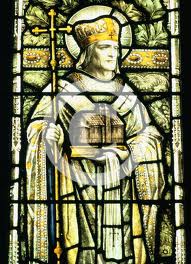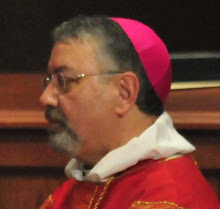 |
| The Lord is risen indeed! |
And yet death is still with us. We try to convince ourselves that it is just a part of living, and that it is a part of the natural order. But the Scriptures teach us that it is a terrible thing, and a departure from God's initial plan for us in creation. It was because of sin, that is, choosing our way instead of God's, that death entered the world, and when Christ returns the next time, it will be done away with for ever and ever. You see, God's original intent was for us to live in the garden with him forever, and to walk in perfect harmony and health. Imagine such a place, where all creatures live together in harmony and peace, and where no one has less than they need. It sounds a bit like heaven doesn't it, and it should, because heaven is merely the restoration of what God initially intended for us in creation.
And so understood in light of creation, death becomes that thing which brings us ill-health, dis-harmony, non-peace, want, strife, and extermination. It is not our friend that releases us from suffering. It is rather the enemy of all of the good gifts that God the Father intended for you and me when he put our ancestors in that beautiful garden. And that is the wonder of Easter. God's love for us on that first Sunday after the death of Jesus was so absolute, so complete, so powerful, that it overcame death itself and enabled Jesus to take up his life again.
Imagine what that means. The Resurrection of Jesus proves that God's love overcomes all of your ill-health, all of the dis-harmony and non-peace in your life. It overcomes want, and strife, and extermination. It allows us to realize that although Satan has been given power to walk about in this world for a time wrecking what he will, God's love has overcome his ravages, the ravages of sin and death, just as surely as Jesus overcame him when the Devil tempted him in the wilderness. Jesus has become the first fruits of the triumph of God in this world. His healings are the first fruits of what we can expect, and his provision for the spiritual and physical needs of people in ancient Roman Palistina show us what is just around the corner for all of us. We have every right to expect that ultimately, we will share in the completeness of His victory.
That is why it is so important for us to say "I believe in the resurrection of the body." If it was only some sort of mythic continuation or perceived continuing influence of the spirit of Jesus' teaching, it ceases to be the proof that God's love has and can overcome the greatest and most destructive force that the world, the flesh, and the Devil can launch in our direction. But if he really was dead, and descended into hell, leading captivity captive, and then triumphed by coming back to life, then the Resurrection of Jesus demonstrates for all time that God's love can overcome anything that might threaten to destroy you or me. That is why our Holy Mother the Church has always insisted that the coming back to life of Jesus is actual, and physical, and true.
What is death accomplishing in your life today? Are you estranged from someone you loved? Has some dread disease invaded your body? Does guilt or shame over some act past or present rob you of joy and prevent you from being friends with someone you value deeply? Does some long standing habit or addiction shackle you? Jesus Christ has overcome our enemy death, and all that it can do in this world. For a short time, the enemy of our souls stalks about like a raging lion, seeking whom he may devour. But our victory is assured, because Jesus Christ, the second person of the Holy and Blessed Trinity was sent to earth by God the Father to demonstrate the full meaning of true love. Jesus overcame death with the ill-health, dis-harmony, and non-peace that it brings. Jesus overcame death with the want, strife, and extermination which travels in its train. The days of death's dominion on this Earth are numbered. As the poet said, "Death be not proud, though some have called thee mighty and dreadful, for thou art not so...Death, thou shalt die!"
The Resurrection of Jesus the Messiah is the proof that God 's love has won the day. Today, we, living in the power of the Holy Spirit, are called to look beyond the realities of death's destruction with the certain hope that a new day is coming. And we are called to live in such a way that as our lives promote peace, and reconciliation, and relief of suffering, and the banishment of aloneness, all people might see the change that Jesus has made in us, and through us in this world. And armed with this realization, they will understand anew the love of God to all people, and be drawn to embrace him as Saviour and Lord, as Brother and Friend.
On this blessed Easter, I call on you, the people of God, to name those ravages of death in your lives. Call them what they are, and determine boldly to confront and resist them in the Name of Jesus Christ, who has overcome death. Bear with courage and grace those last savage assaults of our enemy the Devil, fortified with the knowledge that God's love has carried the day, this day and every day, and all the days to come. Know that as we are faithful, God's love which raised Christ from the dead will inspire us to bear our burdens even as he bore his, and that we will rise triumphant with him at the last. And know that by your courage, and the example of your firm reliance on him, others for whom he died will find strength to walk the path to heaven and to restoration with us and with him. In the Name of the Father, and of the Son, and of the Holy Ghost. AMEN.

































